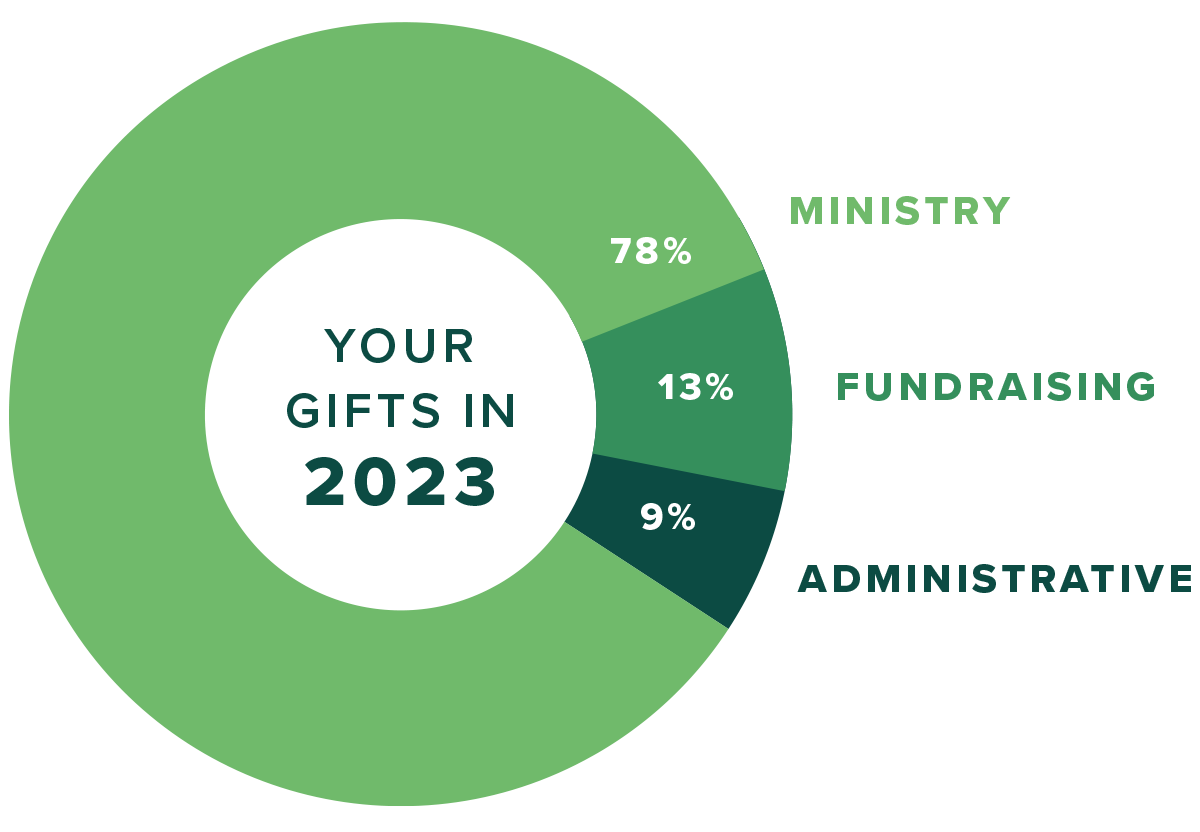A Hope Center in Kenya is devoted to keeping teens engaged and away from vices in the community. In the process, the youths acquire marketable skills, work on their talents, and enjoy attending a variety of activities at the center.

A little kitchen garden at the Hope Center, where members of the agriculture club grow vegetables.
Child Champions at Hope Centers in Kenya seek to keep teens engaged with constructive activities in their free time.
Because, according to a UNICEF report, if teens don’t stay busy, they’re more likely to engage in risky behavior including unprotected sex and the use of tobacco, alcohol, and drugs.
The report further states that adolescents are often at higher risk of poverty than younger children and may not qualify for social protection benefits. For some youths, poverty leads to child labor.
But keeping teens engaged in productive activities hasn’t always been easy, says Charles, Director of the Upendo Hope Center in Jilore.
“We realized that some teens were not enjoying their time at the center as much as they would have wanted to,” he says. “Some came because their parents wanted them to, while some came because they respected us. This made us reach out to them and ask for their ideas of how to make the program better.”

Charles is Director of the Upendo Hope Center in Jilore.
The problem was that the teens had outgrown most activities at the center, according to Rose, a Child Champion there.
“When the center was set up in 2008, it was rich in child-friendly activities, and the kids loved the experience here,” she says.
“But as they transitioned to teenage hood, they outgrew the activities. It reached a point [where] most came for the food and wanted to leave after lunch because they wondered why they had to be here. We had to quickly jump into action.”
So, Child Champions at the Hope Center met with the teens to ask them what sorts of activities would interest them.
The youths said they did enjoy the child development classes that addressed their physical, cognitive, and spiritual needs.
They just wanted more engagement when not in class.
New Activities Focus on Keeping Youths Busy
After meeting with the teens, the Child Champions introduced a variety of new activities.
They introduced skills training in agriculture, and they let the youths plant and tend a vegetable garden on a portion of land at the center.
Masonry also was introduced, and the teens now learn how to make modern bricks. Some of the bricks they made have been used to construct buildings at the center.
The Hope Center also enhanced its guidance and counseling component by inviting speakers who are conversant with issues that teens face, and the teens now enjoy talking to and hearing from new people.
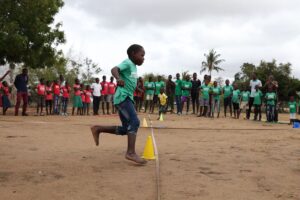
The Hope Center now offers a variety of sports to keep youths busy.
The center also advanced its sports program to include soccer, volleyball, and athletics.
Rose is in charge of training the girls in volleyball, and Charles trains the boys in soccer. Since the Hope Center doesn’t have a big playground, they use the community playground to play and practice for sports competitions that happen every holiday.
They get to compete with other Hope Centers and the top team receives an award.
“Making the sports competitive made the youths enjoy it better,” says Charles. “During the long school breaks, they would come to the center to meet with their respective trainers daily.”
The center provides food whenever the teens are around and, Charles says, that was enough incentive to keep them engaged throughout the holidays.
All of the new activities keep the teens busy and tire them out.
“Once they are done with their practice, they are usually tired, so no one will have time to roam around the village and engage in any vices,” Charles says.
“They would go home and rest, waiting for the following day. They also get to be taught discipline in the sports, so it helps.”
Letting Them Nurture Their Dreams
Other new activities introduced were scouting, drama, and theater.
The center reached out to a professional in drama and theater who volunteers to teach the teens.
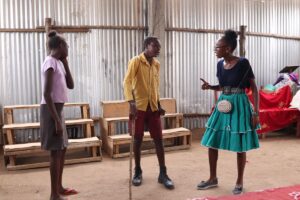
Members of the drama club practice a skit at the Hope Center.
The center also customized some theater props to allow them to have a feel of a theater.
A large number of teens registered for this and enjoy training and shooting videos that they upload on the center’s YouTube channel.
They also get a chance to learn digital photography.
In addition to introducing new activities at the center, the Child Champions also organize an academic clinic every holiday where all registered kids come into the center with their parents and have talks with the Child Champions about their school performance.
They share the challenges they face at school and at home and the champions help them find solutions.
It’s also a chance for the Child Champions, in the presence of the parents, to review what their dreams are.
“When they join the center, we ask what their dreams are,” says Rose. “But we know that along the line, they get to know themselves better, and at times their dreams change. So we ask and write them down. It’s always a chance to evaluate whether they’re on track with the dreams.”
Dangers Lure Idle Youths
Had they not engaged the youths in finding youth-friendly activities, Rose says, they would have risked losing most of them.
She says the moral decay among teens in their community is attributed to the lack of engagement of youths who are idle yet have a lot of energy.
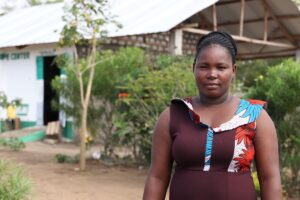
Rose is a Child Champion at the Upendo Hope Center.
“I believe an idle mind is the devil’s workshop, and it is worse among the teens who have a lot of energy but lack a place to direct it to.
“So, they engage in something, and most of the time, it is never constructive,” she says.
For most youths in Jilore who are not registered in the sponsorship program and lack mentors to guide them, their fate of despair and poverty is practically sealed.
Youths who aren’t engaged in healthy activities are exposed to drug and substance abuse, Charles and Rose say. And to keep up with the abuse, they have to steal because most of them are from poor families who can’t afford to finance a lifestyle of drug abuse.
“They slowly start by stealing chickens and goats in the community, and they then upgrade to bigger items. Unfortunately, when a teen turns to that lifestyle, they are bound to either end up in jail or get killed through mob justice when caught,” Rose says.
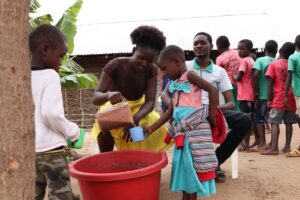
Mealtime at the Hope Center draws a crowd.
Some end up being drug addicts and become lazy and grow to be dependent, even in old age, says Charles.
So the poverty cycle in the community is passed on generation to generation.
Some of these youths engage in early sex which accounts for most school dropouts, teen pregnancies, and early marriages in the community. Unfortunately, Charles says, those marriages rarely work out and contribute to a majority of single-parent families.
Poverty Makes Parenting Difficult
With challenges growing by the day, the Child Champions say, the community needs to bear more of the burden of keeping kids engaged, but it frequently does not mostly because of poverty.
“Gone are [the] days when everyone cared for each other’s kids,” says Rose. “Today, everyone cares for their individual child, so even when they see another child falling off, no one cares to guide them back to the right path. We are selfish!”
Also, the poverty in the community has parents leaving home early to go look for food and returning late. Quality time with their kids is not a priority when families in poverty face hunger every day.
But thanks to the Hope Center working to address some of the issues and even engaging with parents, more teens are protected from the dangers that lurk in the community.
“We are confident that apart from keeping the teens busy, we are also equipping them with skills, helping them work on their talents, and preparing responsible adults who will make this community better,” says Charles.
Bring hope to kids in hard places like Jilore. Sponsor a child today!
We are accountable to the children we serve AND to our donors.
Our accountability to our donors is one of our highest priorities. Our goal is to use the funds entrusted to us as wise stewards. To do this requires continued monitoring of our fund distribution. OneChild is also a member in good standing with the Evangelical Council for Financial Accountability (ECFA)
